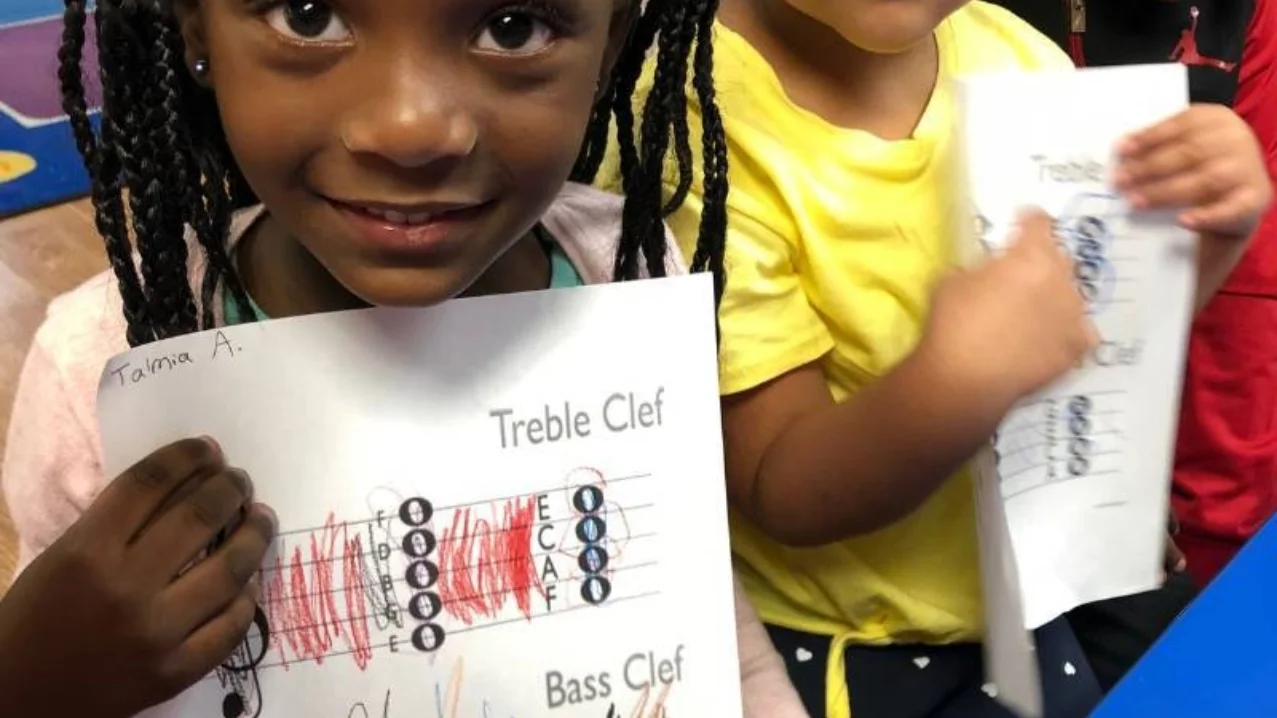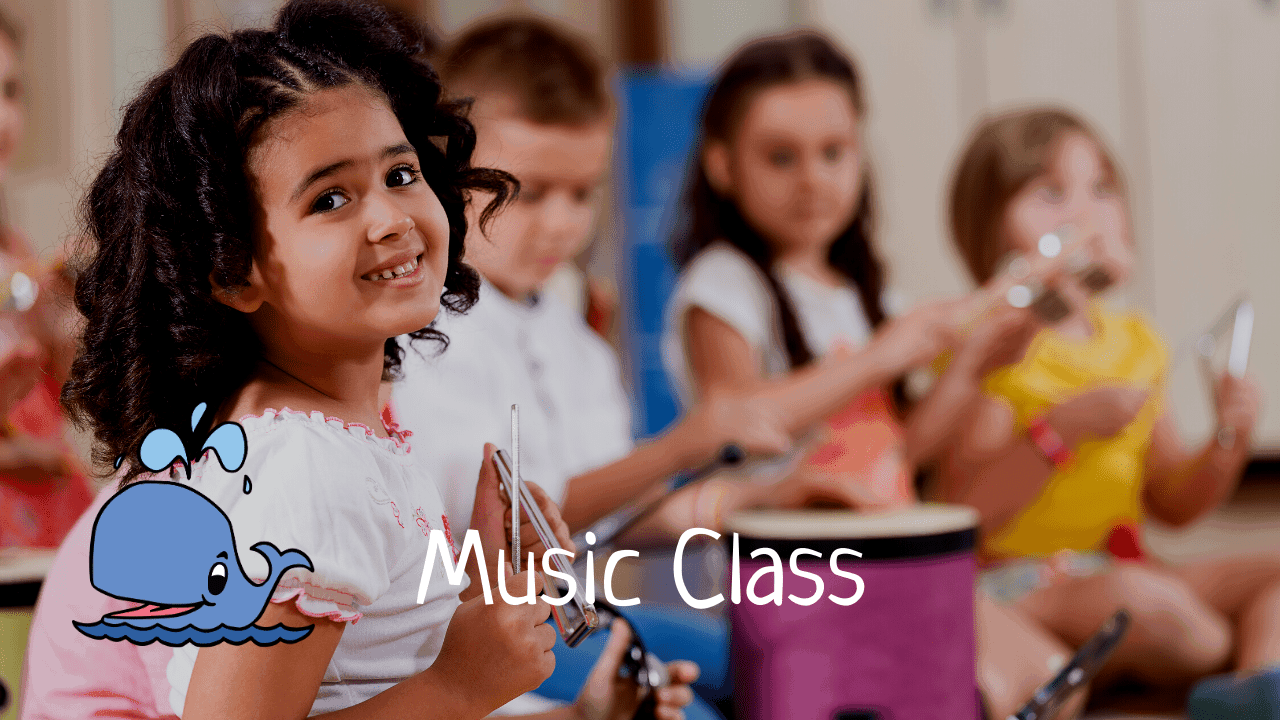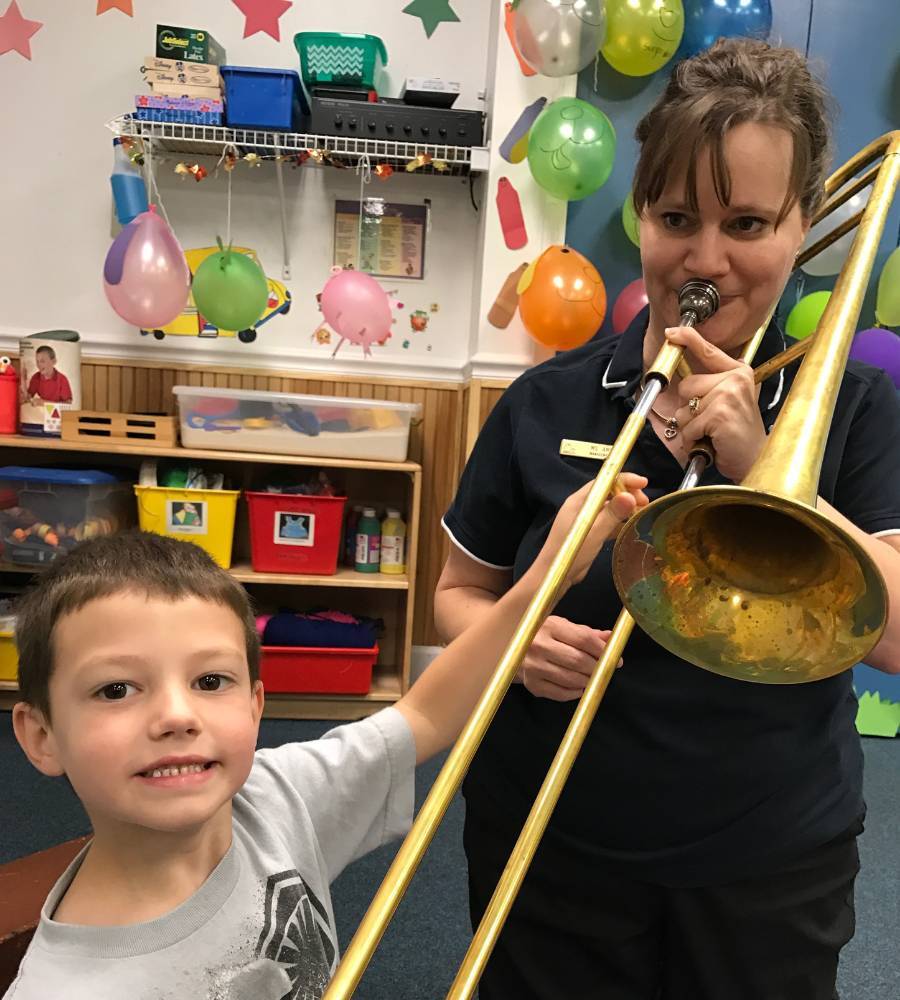
Music Class
In Grace Community School’s Music Class, we use the power of music to enrich the lives of our students and foster their creativity, confidence, and cognitive development. Our dedicated instructors guide children aged 2 and up through a comprehensive and engaging curriculum, covering music theory, note reading, instrument playing, and much more. We strive to provide a nurturing environment that empowers our students to explore their musical talents and passion, while building a strong foundation for their future musical endeavors. Discover the exciting opportunities that await your child in our Music Class and set them on a path to a lifetime of musical enjoyment and personal growth.

Music Class, along with Art Class, Dance Class, and Karate Class, is part of Grace Community School’s extracurricular program. These special classes expand beyond the College Can Begin at 2 Curriculum we use in our preschool program, and give our students a chance to express themselves through a diverse range of activities.
The Benefits of Music Instruction for Children
At Grace Community School, our Music Class is designed to cultivate your child’s enthusiasm for music and provide them with the tools they need to become confident and competent musicians. Through activities such as singing songs, playing instruments, recognizing patterns in sound, and exploring movement through dance, we work to develop their cognitive skills while helping them gain a better understanding of music theory. Our classes are designed to be fun, creative experiences that help your child build the skills they need to succeed in any area of study and life.

Music has the power to enrich lives, inspire creativity, and foster emotional connections. When children are exposed to music education from an early age, it can have a lasting impact on their cognitive, social, and emotional development. We use music instruction to help children become well-rounded individuals. Here are some of the numerous benefits that music education can provide for young learners, along with the developmental domains they support:
Cognitive Development: one of the most significant benefits of music instruction for children is the enhancement of their cognitive abilities. Engaging in musical activities stimulates various areas of the brain, improving memory, attention, and problem-solving skills. Research has shown that children who are involved in music classes consistently perform better academically, particularly in math and language arts.
Emotional Expression and Regulation: Music can evoke deep emotions, providing children with a unique medium for expressing their feelings. Through singing, playing instruments, and composing, children learn to articulate their emotions in a healthy and creative way. Furthermore, participating in music activities can help children develop emotional regulation skills, which are essential for managing stress and maintaining emotional well-being.
Social Skills and Teamwork (Socio-Emotional Domain): Music instruction encourages collaboration and cooperation among children, as they work together in groups to create harmonious sounds. This fosters the development of essential social skills, such as communication, empathy, and conflict resolution. By working together in a musical context, children learn to appreciate different perspectives and support one another in a shared goal.
Motor Skills and Coordination: Playing musical instruments and participating in movement activities, such as dance, help children develop fine and gross motor skills. These activities require precise coordination and control, which can improve children’s overall physical abilities and enhance their performance in sports and other physical activities.
Self-Confidence and Self-Esteem (Self-Help/Adaptive Domain): As children master new musical skills and showcase their talents in performances, they build self-confidence and self-esteem. Music instruction fosters a sense of accomplishment and pride, helping children feel more secure in their abilities and more willing to take on new challenges.
Discipline and Perseverance: Learning to play an instrument or mastering complex musical concepts requires patience and dedication. Children who participate in music instruction develop the discipline and perseverance needed to tackle difficult tasks and work towards long-term goals. These valuable life skills can be applied to various aspects of their lives, from academics to personal relationships.
Our Comprehensive Music Curriculum
At Grace Community School, we have designed a comprehensive music curriculum that caters to children’s diverse interests and learning styles. By integrating various aspects of music education, we aim to create a well-rounded musical experience that fosters a deep understanding and appreciation of music. Our curriculum focuses on three core components: Music Theory and Note Reading, Instrument Playing and Performance, and Rhythm, Songs, and Musical Creativity.
Music Theory and Note Reading
A solid foundation in music theory is essential for any aspiring musician. Our curriculum introduces children to the basics of music notation, including pitch, clefs, note values, and time signatures. Through engaging activities and interactive lessons, students learn to read sheet music and recognize the building blocks of melody and harmony. This knowledge empowers them to analyze, understand, and interpret a wide range of musical styles and genres.
Instrument Playing and Performance
A big part of our music curriculum is the opportunity for children to learn and play musical instruments. Students are exposed to various instruments, such as keyboard, guitar, percussion, and wind instruments, allowing them to discover their unique preferences and talents. Our experienced instructors guide children through the process of learning proper technique, practicing effectively, and mastering progressively challenging pieces. As students develop their skills, they are given opportunities to perform in front of their peers, teachers, and parents, helping to build their confidence and stage presence.

Rhythm, Songs, and Musical Creativity
We believe that nurturing creativity is a vital aspect of music education. Our curriculum encourages children to explore the expressive and imaginative dimensions of music through rhythm and songwriting activities. Students learn to create and recognize rhythmic patterns, identify different musical forms, and compose their own melodies and lyrics. By engaging in group singing, movement exercises, and collaborative composition projects, children develop a sense of musicality and a deeper connection to the music they create and enjoy.
We want students to have a rich, multifaceted musical experience that fosters a lifelong love of music. By combining music theory, instrument playing, and creative exploration, we aim to nurture well-rounded musicians who appreciate the beauty and complexity of music and are eager to share their talents with the world.
A Lifetime of Musical Enjoyment and Growth
It all comes together to build a strong foundation for musical enjoyment, now and throughout life. By teaching music theory, instrument playing, and creative expression, we prepare children for future musical endeavors, whether they choose to join a school band, participate in a community orchestra, or explore music composition and production.
Through music instruction, students learn the value of perseverance, practice, and continuous improvement. These lessons foster a growth mindset that can be applied to all aspects of their lives, promoting resilience and adaptability in the face of challenges. As students continue to develop their musical abilities, they also learn to embrace new experiences and opportunities for growth.
Music appreciation is important! Our music program exposes children to a wide range of musical styles, genres, and cultural traditions. This diverse exposure encourages students to appreciate the richness and diversity of the musical landscape, opening their minds to new sounds and experiences. As they grow, this appreciation can inspire them to explore different genres and attend live performances, further enriching their lives through music.

The skills and knowledge gained through music education can be a catalyst for lifelong learning. As children become more familiar with the world of music, they may be inspired to pursue further education or independent study in areas such as music history, ethnomusicology, or music technology. This ongoing pursuit of knowledge contributes to their personal growth and intellectual curiosity.
Music has the power to bring people together, fostering connections and shared experiences. As students engage in musical activities throughout their lives, they have the opportunity to participate in community events, join ensembles or choirs, and connect with fellow music lovers. These social experiences can create lasting friendships and a sense of belonging within the broader musical community.

Music Class Pricing and Enrollment Details
Music Class is available at all Grace Community School locations for ages two years and up. With a cost of just $10 per week, our classes are an affordable way to introduce your child to the joys of music and set the stage for a lifetime of musical enjoyment and growth. Give your child the gift of music and watch as they flourish into confident, creative, and well-rounded individuals. Register your child today for our Music Class!